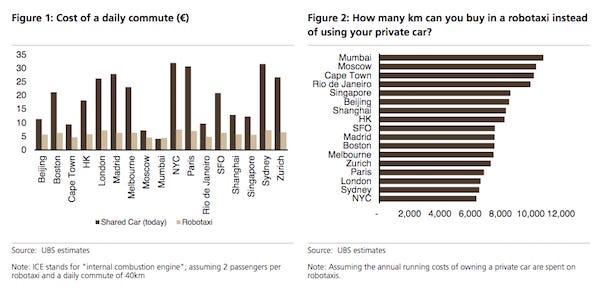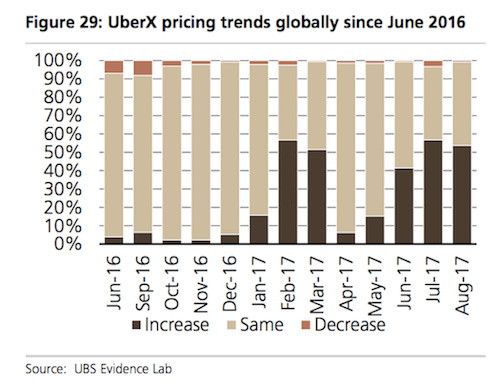Why Ikea bought TaskRabbit, Uber to vote on board reforms, Ford CEO wouldn’t get in a driverless car
LXXVII
Would you ride in a self-driving car?
Ford CEO Jim Hackett wouldn’t:
Hackett, speaking at a breakfast lecture series at Grand Valley State University, polled the audience by asking how many participants would not get in a self-driving car today if given the chance. About a quarter of the room raised their hands.
“The trust isn’t real high,” he said. “I wouldn’t yet, either.”
Hackett became Ford’s CEO in May after Mark Fields was ousted by the company’s board. He’s now trying to prove that Ford, an 114-year-old company, can hang with cool kids like Google and Tesla as everyone races toward ride-sharing, driverless cars, and a whole bunch of other futuristic “mobility” concepts. In the last month alone, Ford has planned a joint venture to make electric cars in China, teamed up with India automaker Mahindra, partnered with Domino’s, partnered with Lyft, and created a new group—“Team Edison”—to work on electric vehicles. Hackett is expected to update investors on Ford’s progress at a meeting today.
“I haven’t done a damn thing yet, but I have some ideas,” he says.
Elsewhere, here is an accident report from a human-driven Ford Ranger that rear-ended an autonomous vehicle from GM’s Cruise Automation early in the morning on Sept. 19. “The Ranger crept forward slowly into the Cruise AV, which was completely stationary at the time of the collision,” the report reads. “The parties exchanged information and the driver of the Ranger apologized, adding that he was on his cell phone.”
One of the big problems with autonomous vehicles is that while they are very good at following traffic rules, humans aren’t. People speed, run red lights, cross solid white lines, creep into intersections while on their cell phones. Driving to the letter of the law is safe only when everyone else operates the same way. Maybe the real reason Jim Hackett won’t get into a driverless car yet isn’t because he doesn’t trust the car, but because he doesn’t trust the car while everything else on the road is still being driven by a human.
Robo-savings.
Here is a fun report from UBS arguing that robotaxis, aka, driverless taxis, will cost half what owning a private car does today for a single person trying to get around.
UBS thinks the shift toward electric vehicles alone will reduce the fees robotaxi companies charge by 15%-20%. It expects the “robo” part—aka, getting rid of human drivers—to cut user costs by another 25%. UBS estimates that the typical household could save €5,000 a year (about $5,875) by switching to robotaxisi in the future. They are also counting on competition to drive down prices.
An interesting side note in this report is that UBS remains unconvinced that “shared mobility,” i.e., taking mostly Uber and Lyft, is cheaper than owning your own car today, despite how hard both companies have tried to sell some combination of ride-sharing plus public transit as a more affordable alternative. UBS finds that the cost of shared mobility today is two to three times higher than owning an internal combustion engine car. They also note that Uber has raised prices on its private UberX service in nearly a third of markets over the last year, based on the 600 they track, and lowered fares in only 3% of markets.
DIY is over.
Swedish home goods giant Ikea last week bought TaskRabbit, a home services startup whose most popular task is—you guessed it—assembling Ikea furniture.
It’s unclear how much Ikea paid for the startup, which has raised nearly $50 million to date and is considered profitable. Sources told Recode that TaskRabbit was likely to operate independently under Ikea and still be able to strike other partnerships, such as its collaboration with Amazon.
TaskRabbit is one of the OG “sharing economy” companies, founded in Boston in 2008. It’s since been joined by startups that give us rides, bring us food, do our laundry, give massages, walk the dog, and deliver booze. Of course there isn’t really much “sharing” going on at all in the “sharing economy,” which is a mess of middleman services enabled by smartphone apps and venture-capital subsidies. Most of the workers on these platforms are hired as contractors rather than employees, without benefits and at relatively low wages.
Do-it-yourself has been part of the Ikea ethos since the company started designing its own furniture in the 1950s. But America’s enthusiasm for DIY isn’t what it once was. We want things delivered to us, for free and in two days or less. On this Ikea is woefully behind. In the US, Ikea delivery starts at $59 and assembly starts at $89, an anachronism in an era of cheap on-demand labor and free two-day delivery. No wonder people were turning to TaskRabbit instead.
Uber Uber Uber.
I saved Uber for last this week, for those of you who are sick of the Uber drama:
Wednesday (Sept. 27): Japanese tech giant SoftBank, which is planning a multibillion-dollar investment in Uber, reportedly hashes out a deal to limit former CEO Travis Kalanick’s power at the company. Recently appointed Uber CEO Dara Khosrowshahi is reportedly on board with a SoftBank investment.
Thursday: Uber and investor Goldman Sachs propose limiting Travis’s control at Uber.
Friday: Travis exercises his right to appoint two new members to Uber’s board (currently the subject of a lawsuit with Uber investor Benchmark): former Xerox CEO Ursula Burns and former Merrill Lynch CEO John Thain. Uber’s comms team calls the move “a complete surprise to Uber and its board.”
Also Friday: Dara calls Travis’s actions “disappointing” in a letter to Uber employees.
Monday: Outside of the boardroom, Uber’s infamous Stroz report—the one it commissioned before acquiring Anthony Levandowski’s startup Otto—is made public. It is pretty damning for Levandowski/Uber.
Today: Uber plans to vote on board reforms and whether to pursue the deal with SoftBank. Bloomberg: “Those two coordinated moves could drastically reshape the ride-hailing company’s governance, while officially kick-starting what could end up being the largest private stock sale in history.”
Also today: Dara is scheduled to meet with London regulators to negotiate Uber’s path forward after its application to renew its license was denied.
There was a brief period after Uber appointed Dara when it looked like things might be calming down. Travis appeared at the all-hands meeting to introduce his successor. They hugged on stage. The lawsuit with Benchmark moved to arbitration. Leaks from the board slowed down. Employees breathed a sigh of relief.
Now that looks like the calm before the storm. Investors and board members have resumed leaking to the press, the Benchmark suit seems more relevant than ever, and it’s hard to imagine Travis and Dara hugging anywhere. You must imagine that Dara saw all of this coming when he accepted the Uber chief executive job, but perhaps not so much so soon. You know, just another week at the world’s largest and most chaotic technology startup.
Other stuff.
New York City Is Using Sheriffs and Obscure Building Code Violations to Crack Down on Airbnb. Lyft close to selecting IPO adviser. Lyft eyes London. Managed by Q acquires Y Combinator grad Hivy. Eden raises $10 million series A. Envoy Technologies lands $1.5 million for electric vehicle sharing. Instacart plans expansion to Canada. Lyft and Uber responsible for 64% of traffic violations in downtown San Francisco. US roads aren’t ready for self-driving cars. Amazon partners with Olo on food delivery. Tilda Swinton orbits the moon for Lyft. Uber’s head of Northern Europe quits. What do self-driving cars mean for public radio? Loftium Unwittingly Forms General Partnerships with Homebuyers. Uber sign language. Uber lounges. On-demand STD test kits. Let’s not forget about WeWork. “I do think as long as human beings remain tribal creatures, we are always going to crave human touch as much as high-tech.”






